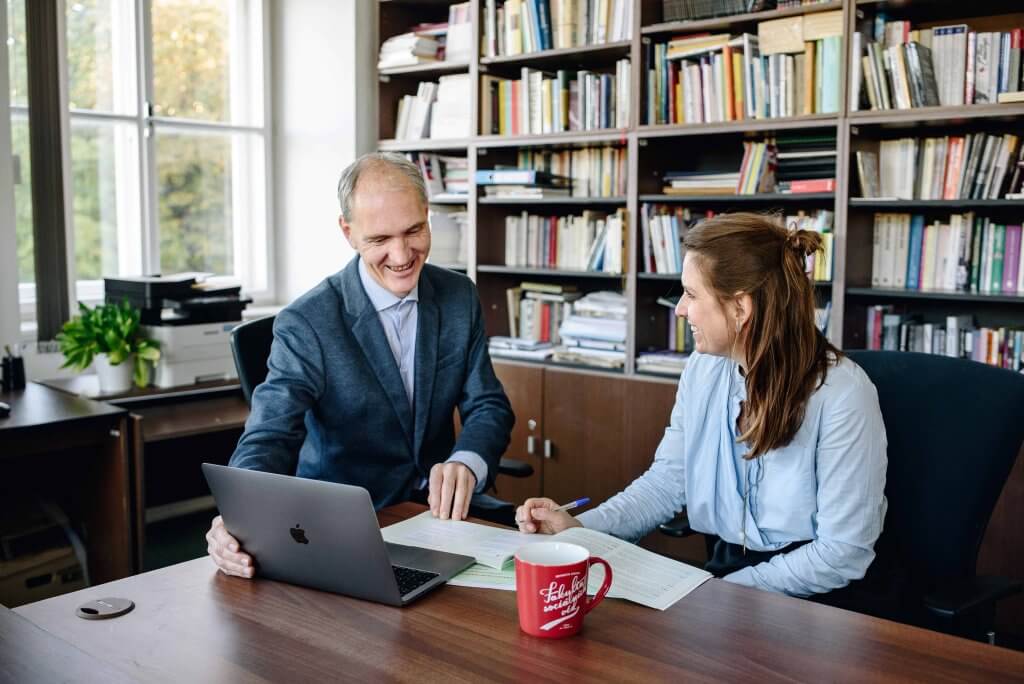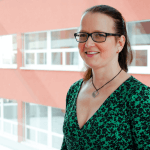“It is important that the social sciences give hope to society”

Why is science communication important to us? Do the social sciences fit among the exact ones? And why are social sciences beneficial to the public?
Read the interview with the vice dean for science and research prof. Arnošte Veselý and vice-dean for external relations dr. Tereza Klabíková Rábová, which was created on the occasion of the launch of a website about science.
Tereza Klabíková Rábová: This interview is dedicated to the launch of the new website of the Faculty of Social Sciences, which is to be dedicated to the communication of science and scientific results. Arnošt, why did we decide to take this step and why is the communication of science important to us?
Arnošt Veselý: So let’s start with how science is important to the faculty. We now have over 80 projects and work on them is a really big component of functioning at FSV UK. On the other hand, I must say, all academics have a lot of other responsibilities – we teach, we have some third role, we have a lot of administrative management duties, so there is not much time left for the communication of science.
TKR: I would just like to add that we decided to have the page dedicated to science, communication of scientific results and information about projects separately in order to make the whole area clearer for users, so that the extremely interesting results are visible.
AV: I think that this is a very important step precisely because we often don’t have time to promote what we have arrived at. There is a really large number of those projects at the faculty, they are very interesting and they span – not over five, but over several scientific disciplines. For us, it often ends with the fact that we publish something, that an article or monograph is published, but then we no longer have time to distribute, publish and translate it into an understandable language that the wider public would understand.
TKR: I also think that the field of communication of science and scientific results is not only necessary for the reporting of the scientific work, but it also has a social demand, in professional and non-professional society, the whole agenda connects to the science of science communication. And I think that it would be good for FSV to follow that trend and actually develop it.
AV: Definitely. When we listen to the discussions about what we actually need, what fields we need, everyone agrees that we need medical, natural science and technical fields. But the social sciences are often looked down upon. At the same time, if we look at the key major crises that we are going through now, such as the war in Ukraine, the energy crisis, the housing crisis, the social crisis, the economic crisis, these are all crises that have some social aspect. And it is terribly important that we are able to sell the importance of those social sciences, that they can actually contribute to the solution of important social issues.
TKR: We will gradually add to this website links to interviews from our faculty podcast De Facto, which deal with professional topics in understandable language. We will also add interviews and information about current scientific projects. Actually, I feel that it is also important for the public debate to kick off the topic in a way that is comprehensible and to give it the platform such as this website.
AV: In the future, I would definitely like the public to influence what we research. So that these are topics that really resonate in the society, that are current and that give answers to questions that interest the public, not the one that interest us – researches. I have a specific example – we know a lot of things, for example in the field of education, but sometimes we lack basic answers to very simple questions. Let’s say, for example, the overviews of how they actually learn in schools, how many teachers we have, how many principals we have, how overloaded they are. These are actually questions for which won’t get you any purely academic points, but they are certainly important to know. And only on this we can build more theoretical, more academic knowledge.
What else I think is important for the social sciences is to give a little hope. So that it’s not just criticism, a dark vision of what’s wrong. Our faculty is exceptional in that we have a whole range of disciplines here and a whole range of people who are actually also practitioners. And they deal not only with what doesn’t work, but also with what could be better and, most importantly, how to do it. Of course, we can’t set high and unrealistic goals here, we won’t change the world. However, if we could manage to give meaning, hope and solutions to those conversations, so that it would have an overlap into something positive, that would certainly be nice.


